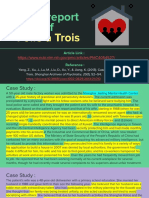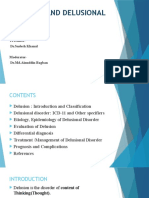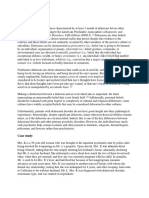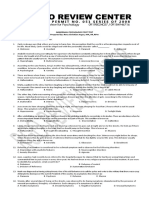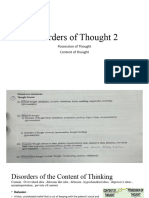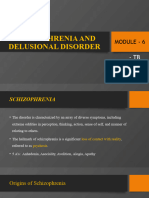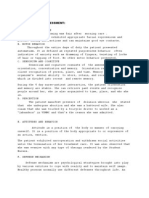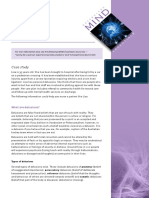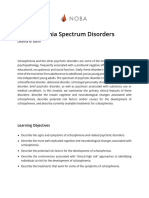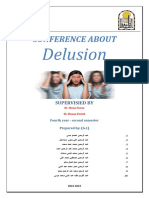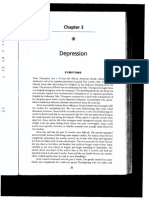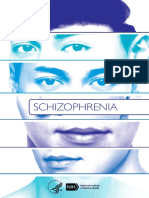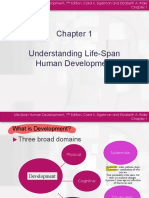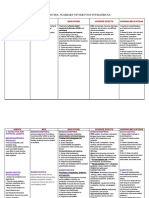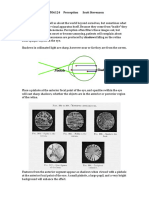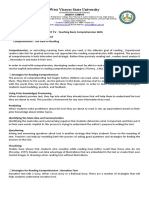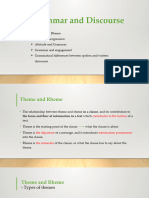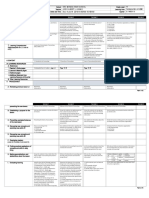When we were in the hospital celebrating with the patients by playing songs, we played
"Misterah" song, which means "dominant." When she heard the song, she said she knew
the Misterah song because she played it when she came with the police here to celebrate
winning the case about her father trying to kill her. But after we read the file, we knew
that she was the one who was threatening her family with death, so they called the police
to stop her.
She also said that her father had hid a camera in her room to watch what she was doing,
but she did not see exactly where the camera was. She said that she knew there was a
camera because when she was playing music and dancing, her father would see what she
was doing, even if her room door was locked.
She had a good orientation toward the time, place, and people because we asked her,
“When did she come here?” She told us two months ago. She said she was happy when
she came to the psychiatric hospital instead of going home. She asked us if we were
nursing students, and we would study her case.
Her attention and concentration were good when we talked to her. Since she was so
meticulous about our conversation, she said that every conversation with you made me
remember every person who plotted against me to cause trouble between me and my
family.
Her memory was good. She mentioned that she remembered what happened two months
ago when she came with the police here, when she began to feel that her family was
watching her two years ago, and when her mother had not loved her seven years ago.
She has good judgment because when we suggested that she marry and leave her family,
she said that this is not solution because marriage and leaving them will not change her
feelings toward her family and the husband maybe be unkind to her.
A.k. had been diagnosed with schizophrenia (F20) and delusional disorder (F22).
Schizophrenia is a chronic, severe mental disorder that affects the way a person thinks,
acts, expresses emotions, perceives reality, and relates to others. Though schizophrenia is
not as common as other major mental illnesses, it can be the most chronic and disabling.
People with schizophrenia often have problems doing well in society, at work, at school,
and in relationships. According to what our patient told us, she did not have many
personal relationships when she was studying, and even her relationship with her family
and siblings was not close. A delusion is a belief that is held with strong conviction
despite evidence disproving it that is stronger than any evidence supporting it. It is
distinct from an erroneous belief caused by incomplete information (misconception or
misunderstanding), deficient memory (confabulation) or incorrect perception (illusion).
We noticed that A.K had some delusions when she said that her father tried to kill her
with a knife while she was the one who was putting the knife under her pillow and
threatening them. The difference between schizophrenia and delusional disorder is that
delusional disorder is distinguished from schizophrenia by the presence of delusions
�without any of the other symptoms of psychosis (for example, hallucinations,
disorganized speech, or disorganized behavior).
In many other modes of treatment, in addition to pharmacologic treatment, psychosocial
therapy can benefit the person suffering from a psychiatric illness. Psychosocial refers to
an individual's psychological development in and interaction with their social
environment. Psychosocial treatments (interventions) include structured counseling,
motivational enhancement, case management, care coordination, psychotherapy, and
relapse prevention. Depending on why A.K. has been diagnosed with schizophrenia and
delusional disorder, she may need social skills training, individual psychotherapy,
cognitive behavioral therapy (CBT), and family therapy. In the case of A.K., she
withdrew from her social relationships. So, in the case she is discharged, she may need to
break complex social behavior into simpler steps in order to learn how to relate to others,
such as family, friends, and colleagues, and how to communicate their emotions and
requests. As A.K asked us to help her to know herself and what happened to her, she
needs individual psychotherapy, which helps her to deal with her thoughts and behaviors.
She will learn more about her illness and its effects, as well as how to tell the difference
between what is real and what’s not, and recognize and correct the underlying thinking
that has become distorted. She also needs cognitive behavioral therapy (CBT) because
she also believes that everyone is plotting against her, so CBT will help her change her
thinking and behavior and take the perspective of another person, rather than focus
entirely on herself. Also, it can help to determine what triggers her psychotic episodes
(times when hallucinations or delusions flare up) and how to reduce or stop them by
combining CBT sessions and medication. Also, as A.K. didn't have a close relationship
with her family to tell them what was happening to her and what she was thinking
because they did not understand her, her family will need family therapy to deal with her.
Family therapy will help them deal more effectively with a loved one who has delusional
disorder and schizophrenia, enabling them to contribute to a better outcome for her.
Delusional Disorder: Treatments, Causes, Types & Diagnosis. (2018, January 23). Cleveland
Clinic. Retrieved February 23, 2022, from
https://my.clevelandclinic.org/health/diseases/9599-delusional-disorder
Geddes, J, Price, J, and McKnight, R. (2012). Psychiatry (4th ed., Vol. 3). Oxford Medical.
https://ia800602.us.archive.org/1/items/PsychiatryFourthEditionOxfordMedicalPublicationsSR
G/Psychiatry%2C%20Fourth%20Edition%20 %20Oxford%20Medical%20Publications
%20%5BSRG%5D.pdf
�Psychosocial Treatments. (n.d.). Naml National Illness on Mental Illness. Retrieved February
23, 2022, from
https://www.naminh.org/education/recovery-from-mental-illness/psychosocial-
treatments/
Psychosocial Treatments. (n.d.). Naml National Illness on Mental Illness. Retrieved February 23,
2022, from
https://www.naminh.org/education/recovery-from-mental-illness/psychosocial-
treatments/
Psychotherapy - Mayo Clinic. (2016, March 17). Mayoclinic. Retrieved February 23, 2022, from
https://www.mayoclinic.org/tests-procedures/psychotherapy/about/pac-20384616
Tamminga, C. (2022, February 22). Delusional Disorder. Merck Manuals Consumer Version.
Retrieved February 23, 2022, from https://www.merckmanuals.com/home/mental-health-
disorders/schizophrenia-and-related-disorders/delusional-disorder

